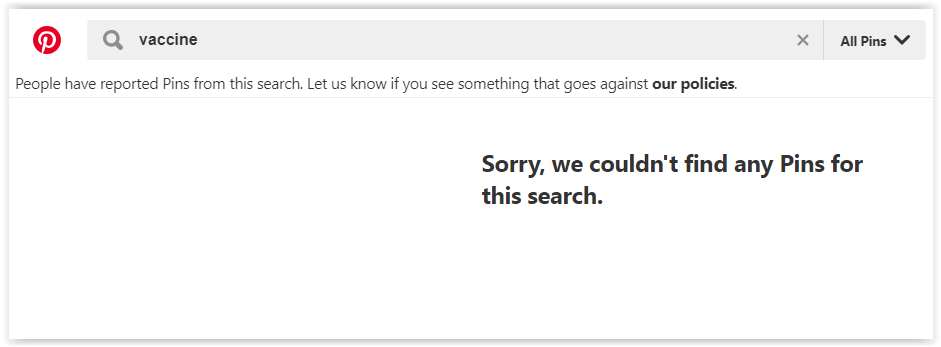KUALA LUMPUR, Feb 21 – Pinterest has blocked all searches on vaccination to combat fake news from anti-vaxxers amid rising measles cases around the world.
Searches for the term “vaccine” or “MMR” (the vaccine against measles, mumps, and rubella) yield no results.
“People have reported Pins from this search,” Pinterest states in a search on “vaccine”.
The image-sharing social media site also said pins about “MMR” often violated its community guidelines.
Adam Schiff, chair of the United States House intelligence committee, posted today a screenshot of disturbing results from Facebook searches for “vaccines”; auto-fill suggestions showed phrases like “vaccination re-education discussion forum”, a “Parents Against Vaccination” group, and the anti-vaccination Virginia-based National Vaccine Information Centre that supports providing exemptions in vaccine policies and laws.
The Guardian reported Pinterest public policy and social impact manager Ifeoma Ozoma as saying that Pinterest was a “place where people come to find inspiration, and there is nothing inspiring about harmful content.”
A 2015 study reportedly found that 75 per cent of Pinterest’s vaccine-related posts were negative. After that, Pinterest reportedly updated its community guidelines to prohibit “promotion of false cures for terminal or chronic illnesses and anti-vaccination advice”.
The visual social media site has also reportedly banned boards by high-profile anti-vaxxers like the National Vaccine Information Centre and Facebook group “Stop Mandatory Vaccination”.
The World Health Organisation (WHO) said last November that reported measles cases increased in 2017, with outbreaks happening in all regions due to the lack of vaccination. An estimated 110,000 people died from the preventable disease.
According to WHO, global coverage of the first dose of the measles vaccine has stalled at 85 per cent for several years, far short of the 95 per cent required to prevent outbreaks. Second dose coverage was 67 per cent.








